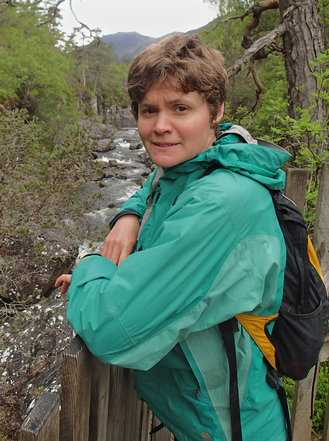Zoë Fleming
ECG Bulletin July 2015
ECG committee member and Honorary Secretary Dr. Zoë Fleming is a research scientist with the National Centre for Atmospheric Science (NCAS), based at the University of Leicester. Here she tells us about her career as an environmental chemist.
|
What inspired you to become a scientist?
As a child, there was so much about nature that I found intriguing and wanted to find out more about. I was interested in how all the systems on the Earth are interlinked. I was good at math at school but didn’t see how it applied to the real world, and it only started to make sense when we used numbers and equations to explain natural phenomena in science lessons. When I was 15, I heard about James Lovelock’s Gaia hypothesis in a biology class and something suddenly clicked. I knew then that the link between chemistry and the Earth’s climate was what I wanted to study. How did you come to specialise in atmospheric chemistry? I didn’t know right away what type of environmental chemistry I would go into. I started off in ecosystem pollution and then marine chemistry. What most fascinated me was how the ice core records provide a footprint of past interactions between land, sea and atmosphere. I then ended up taking continuous measurements of atmospheric chemistry, sampling in situ. The invisible pollution in the atmosphere felt like an area I wanted to find more about. As this pollution isn’t something the public can directly see, we have to let them know what is going on. |
Could you describe your current job?
I carry out data analysis involving the concentrations of trace gases in the atmosphere over the last few decades and how these concentrations have changed over time and according to where the air masses have travelled. I also run a series of small sensors that get used locally and for outreach work. My colleagues are based around the country and there is a lot of teamwork, travelling and networking in the projects I am involved with.
What advice would you give to anyone considering a career in environmental chemistry?
It is a friendly and welcoming area to work in. Most people working in this area have the common goal of wanting to clean up the environment and work out how humans can have a smaller negative impact on the natural world. Jobs are usually quite varied and challenging and it is great if you like being outdoors, doing field work. If you enjoy the links to policy or environmental legislation, there are always ways in which your expertise can be used to make a difference.
What are some of the challenges facing the environmental chemistry community?
As the public and large corporations are becoming more environmentally aware, our advice is often sought, but interpreted differently in the profit-driven world. Businesses, policy-makers and politicians want a black and white answer but environmental solutions are not always as clear-cut. Our advice is not always taken in the way we intended. Some compromises end up out of our hands and we may feel like our advice and solutions are not taken as seriously as we would like.
What is the most rewarding aspect of your career so far?
The field work that I have done has taken me to fabulous locations around the world and I have made many friends along the way. I also enjoy writing papers on general topics and explaining science to the public and to students.
If you weren’t a scientist what would you do?
I would work outdoors, either helping to protect wild places or being involved with mountain activities or expeditions. My childhood ambition was to be a writer for National Geographic; keeping that gold standard in photography and travel/exploration writing in mind keeps on inspiring me to stay curious and learn more about the environment.
I carry out data analysis involving the concentrations of trace gases in the atmosphere over the last few decades and how these concentrations have changed over time and according to where the air masses have travelled. I also run a series of small sensors that get used locally and for outreach work. My colleagues are based around the country and there is a lot of teamwork, travelling and networking in the projects I am involved with.
What advice would you give to anyone considering a career in environmental chemistry?
It is a friendly and welcoming area to work in. Most people working in this area have the common goal of wanting to clean up the environment and work out how humans can have a smaller negative impact on the natural world. Jobs are usually quite varied and challenging and it is great if you like being outdoors, doing field work. If you enjoy the links to policy or environmental legislation, there are always ways in which your expertise can be used to make a difference.
What are some of the challenges facing the environmental chemistry community?
As the public and large corporations are becoming more environmentally aware, our advice is often sought, but interpreted differently in the profit-driven world. Businesses, policy-makers and politicians want a black and white answer but environmental solutions are not always as clear-cut. Our advice is not always taken in the way we intended. Some compromises end up out of our hands and we may feel like our advice and solutions are not taken as seriously as we would like.
What is the most rewarding aspect of your career so far?
The field work that I have done has taken me to fabulous locations around the world and I have made many friends along the way. I also enjoy writing papers on general topics and explaining science to the public and to students.
If you weren’t a scientist what would you do?
I would work outdoors, either helping to protect wild places or being involved with mountain activities or expeditions. My childhood ambition was to be a writer for National Geographic; keeping that gold standard in photography and travel/exploration writing in mind keeps on inspiring me to stay curious and learn more about the environment.


